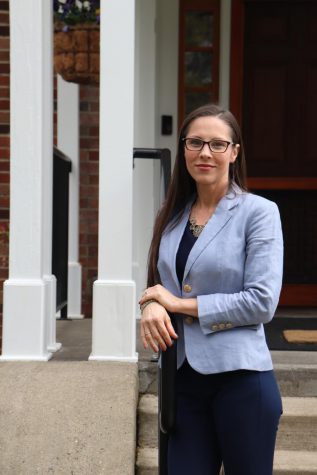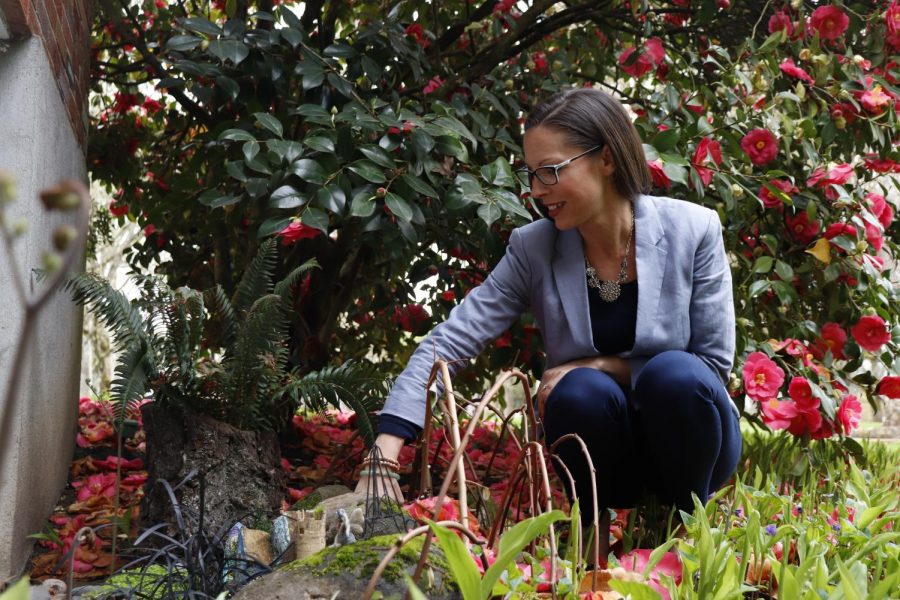Getting to know Linfield’s ‘First Lady’
One of Naomi Pitcocks favorite hobbies is gardning. Here she is brifly clearing flowers that have fallen into her daughters fairy garden made by Carol Gallagher, official groundskeeper. Pitcock’s backyard is decorated with bird feeders that attract humming birds she and president Davis enjoy watching in their free time
April 22, 2019
First lady Naomi Pitcock has joined the Linfield community in many ways. Pitcock, President Miles Davis’s wife, teaches nursing classes full time, as well as volunteering at her daughter’s school, and shows support by attending events at Linfield with her family
Pitcock and Davis finished the 2017-’18 academic year at Shenandoah and arrived at Linfield in July. While Davis started work as President of the college, Pitcock and her daughter were able to explore the area.
“The Linfield community was amazing, everyone who had a kid would bring them by during the summer so that Elizabeth would have someone to play with,” Pitcock said.
Pitcock said they have been enjoying the house, and love the easy access to “the best parts of college life.”
Linfield students know they will likely see the Davis family at extracurricular functions. While she struggled in choosing, Pitcock says some of her favorite have been the Not Your Forte acapella group performances and various sports competitions.
She enjoys being able to attend Linfield events with Davis and her daughter as a family.
Michelle Obama is Pitcock’s hero because “She is such a strong person in her own right, but still such a compliment to her husband.”
Following this model, Pitcock has an extremely developed professional resume and is teaching Nursing 101 at Linfield, which is an introductory nursing class for freshmen and sophomores.
In this class, students can explore nursing history, as well as different career paths and areas that may interest them as nursing students.
Teaching this course has worked out well because it has allowed her to stay based in McMinnville, and offers students more class options in their first and second years at Linfield.
Although she’s a teacher, Pitcock’s biggest fear is public speaking: “My first class [as a teacher] I was so nervous because nursing classes are typically three hours long,” she said. Through practice, this became more natural and now she said she knows exactly how to fill a three hour block.
Pitcock originally worked as a nurse for 15 years. She has now been teaching for 8.
She maintains a passion for learning and educating. She attended old Dominion University for her bachelors of science management. After graduating she was hired at the University of Virginia in their Neuro Trauma Unit.
“My favorite part of college was meeting so many people from all over the world and getting to know what experiences had shaped them,” Pitcock said.
Working in the trauma unit was a steep learning curve for Pitcock, but she enjoyed working with that patient population. The trauma unit specializes in brain and spinal cord injuries as well as tumors in these same areas.
Since UVA is an academic teaching hospital, it advocated for Pitcock to go back to school and achieve her masters degree.
She received her masters degree in community and public health nursing at UVA while working in its trauma unit.

This is when Pitcock discovered her passion for teaching. UVA hosts year four nurses who are finishing their practicum. Practicum is in the last semester for a nursing student and it requires them to work in a practicing hospital with a professional nurse.
“I got to have some of UVAs fourth-year year students come and work with me,” Pitcock said. “I enjoyed going to work so much more when I could share it with a student nurse. So at that point I kinda just decided that maybe teaching would be something that I was interested in.”
With her passion for learning, Pitcock decided to pursue her doctorate at Shenandoah University in Winchester, Virginia. Her dissertation addresses the difficulties in finding breastfeeding resources.
“While I was in graduate school, I had [my daughter] Elizabeth. I had such a difficult time finding breastfeeding resources. I thought this is ridiculous that a graduate level nurse can’t find breastfeeding resources.”
Winchester has a higher Hispanic population than the rest of the state, and Pitcock was concerned that this population specifically was not receiving the help and education they needed. So, as a part of her doctoral research she developed a program that provided free classes and helped during accessible hours of the day regarding prenatal and postnatal care.
After graduating with her doctorate, Pitcock was hired at Shenandoah University as a full-time professor.

